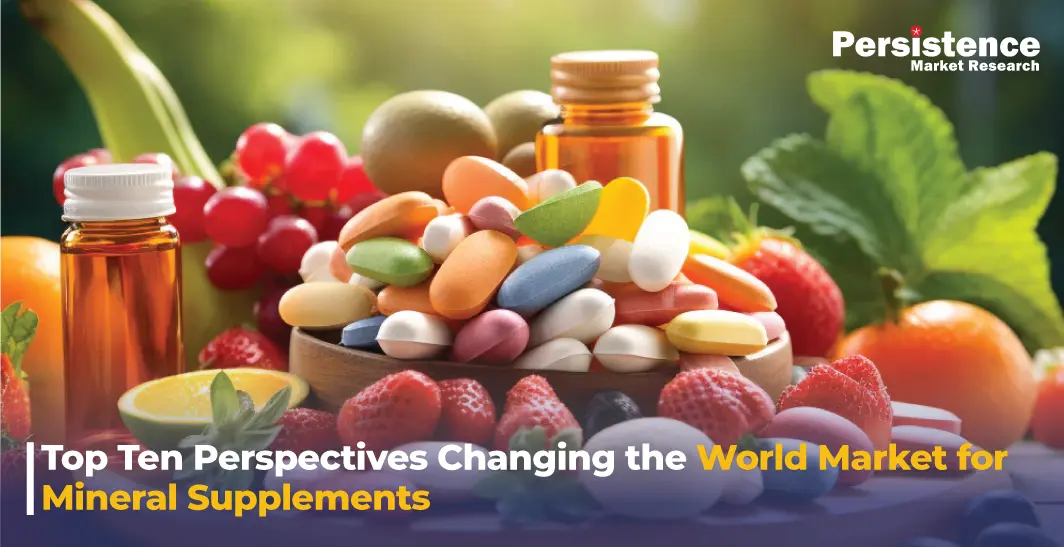- Blog
- Global Minerals Supplements Market
Top Ten Perspectives Changing the World Market for Mineral Supplements
Published On : 14 Jan 2026
The market for mineral supplements has developed far beyond generic multivitamins and chalky pills. Minerals are now essential for proactive nutrition, immunological resilience, age support, and lifestyle disease prevention as health consciousness grows and scientific research advances. Mineral supplementation is fusing tradition and technology to become one of the most important areas of worldwide health and wellbeing, from traditional iron tonics to state-of-the-art nanoparticle delivery methods.

Here are ten insights that define the trajectory of this market and explain why it's so important at the moment.
1. Mineral supplements are now necessary rather than "nice-to-have."
Consumers nowadays are aware that vitamins and minerals are necessary micronutrients rather than optional extras. Fatigue, weakened immunity, problems with bone health, and cognitive decline are associated with deficiencies in minerals such as iron, magnesium, calcium, zinc, and selenium. This awareness supported by frequent blood testing, wearable health tech, and personalized nutrition plans is shifting minerals from “supplements” to everyday essentials. For instance, iron supplements have grown popular among athletes, vegetarians, and those with heavy menstrual cycles; these groups now regularly monitor their hemoglobin and ferritin levels.
2. The Need for Calcium and Magnesium is Being Driven by Aging and Bone Health.
Concerns about bone density, fractures, and musculoskeletal health are drawing attention to minerals like calcium, magnesium, and vitamin D as the world's population ages. Younger people who are interested in preventive skeletal health are also becoming more aware of calcium. Magnesium, on the other hand, is known as a "multi-tasker" mineral since it promotes cardiovascular health, muscle function, and sleep regulation.
3. The Immune System Powered by Copper, Selenium, and Zinc
Minerals including zinc, selenium, and copper became well-known in discussions about immunity as a result of the COVID-19 pandemic, which increased interest in immune support supplements. In particular, zinc is linked to skin health, wound healing, and antiviral defense. Even today, consumers continue to integrate immune-supporting minerals into daily routines, especially during cold seasons or periods of stress. This persistent demand demonstrates how long-lasting changes in supplement behavior can result from public health crises.
4. Customized Nutrition Is Changing How People Eat
Personalized nutrition and data-driven health plans are expanding the minerals market beyond one-size-fits-all multivitamins. Customers are increasingly using blood tests, genetic insights, and digital health platforms to identify specific mineral deficiencies and select targeted supplements accordingly. For instance, wearable health devices and applications now offer chromium for metabolic support and magnesium for stress and sleep, making supplements more quantifiable and purposeful.
5. Sustainable sourcing and clean labeling are more important than ever.
Nowadays, consumers of supplements are astute. Labels for mineral supplements that highlight non-GMO sourcing, vegan formulae, lack of artificial fillers, and traceability are becoming more competitive. This tendency reflects a broader customer demand for sustainability and transparency, where product efficacy is just as important as brand ethics. For example, plant-based chelated minerals where minerals are bonded to amino acids are favored over inorganic forms due to higher absorption and “cleaner” impressions.
6. Delivery formats are becoming more intelligent and intuitive.
The days of supplements being limited to large tablets are over, with new delivery methods enhancing both customer satisfaction and effectiveness. Effervescent drinks and gummies offer flavor appeal, while drops and sprays provide quick absorption. Powders with nanocapsulation improve bioavailability, and time-release capsules ensure long-term nutrient delivery. These innovative formats cater to a wide range of consumers, from children enjoying gummies to senior citizens preferring easy-to-swallow liquids, thus expanding the market's reach.
7. Mineral Optimization and Sports Nutrition
Minerals are essential for electrolyte balance, muscle contraction, and recuperation, and athletes and active people are realizing that performance isn't only about protein and carbohydrates. Sports-oriented mineral formulations often contain magnesium, potassium, calcium, sodium, and zinc. Nowadays, electrolyte powders, recovery supplements, and post-workout drinks all contain functional minerals, making hydration and performance a seamless nutritional experience.
8. Opportunities for Mineral Delivery Are Increased by Functional Beverages and Fortified Foods
Pills and capsules are no longer the exclusive forms of mineral supplements. Functional drinks, nutraceutical-enhanced foods, meal replacements, and fortified snacks are all incorporating them more and more. Convenience-driven consumers who favor combining nutrition with regular eating and drinking experiences are the driving force behind this trend. For instance, electrolyte-rich functional drinks with calcium and magnesium combine hydration with nutritional value, making them appealing to the performance and wellness markets.
9. Distribution and Engagement Are Being Revolutionized by Digital Channels
The marketing and consumption of mineral supplements are changing due to e-commerce and digital health platforms. Customized bundles, auto-refills, and suggestions based on user profiles are made possible by online retailers, subscription services, and direct-to-consumer (D2C) companies. For instance, subscription boxes with personalized mineral packs (such as zinc for immunity or magnesium for sleep) increase long-term adherence and engagement, transforming supplements from an infrequent purchase into a way of life.
10. Trust is being strengthened by regulations that emphasize quality and safety.
Regulators are paying more attention to quality, labeling, and manufacturing procedures as supplements become more and more popular. While certain areas have historically had lenient supplement regulations, nations like the United States, the European Union, Japan, and Australia are strengthening their frameworks, requiring better quality control and more evidence for health claims. In the end, this change promotes market maturity rather than turmoil by safeguarding customers and boosting confidence in respectable businesses.
Conclusion
Targeted, scientifically supported nutrition solutions are replacing generic supplements in the global mineral supplement market. Mineral supplements are becoming a daily requirement for people of all ages due to growing health consciousness, individualized wellness trends, and creative delivery methods. This sector is expected to be crucial to the future of global nutrition as demand for digital accessibility, clean labels, and preventive healthcare rises.
Industry Report

Request Report Sample
Your privacy is important to us; your data is secure
Contact Us
Latest Reports
-
Baby Powder Market by Ingredient Type (Talc-based, Talc-free), Packaging Type (Plastic Bottles, Sustainable/Eco-tins, Sachet/Pouches, Others), Distribution Channel (Offline, Online), and Regional Analysis 2026 – 2033
-
Duck boots market by Product Type (Insulated Duck Boots, Waterproof Duck Boots, Fashion Duck Boots, Thermal Lined Duck Boots), Material (Rubber, Leather, Textile, Combination Materials), End-user (Men, Women, Kids), and Regional Analysis for 2026 – 2033
-
Extruded Polylactic Acid (PLA) Fiber Market by Fiber Type (Monofilament PLA Fiber, Multifilament PLA Fiber, Staple PLA Fiber, Tow PLA Fiber, Specialty PLA Fiber), Grade (Standard Grade, High-Performance Grade, Bio-modified/Enhanced Grade), End-user, and Regional Analysis, 2026 - 2033
-
Tea-Based Skin Care Products Market by Tea Type (Green Tea, Black Tea, Others), Product Form Type (Creams & Lotions, Serums, Cleansers & Masks), Application (Facial Care, Body Care, Others), and Regional Analysis 2026 - 2033
-
North America eVTOL Aircraft Lift Technology (Vectored Thrust, Multirotor, Lift Plus Cruise), Mode of Operation (Piloted, Autonomous, and Semi-Autonomous), Range (0-200 Km, and 200-500 Km), Maximum Take-off Weight (MTOW) (<250 Kg, 250-500 Kg, 500-1500 Kg, and >1500 Kg), Application (Commercial, Military, and Emergency Medical Service), Propulsion Type (Battery-Electric, Hybrid-Electric, and Hydrogen-Electric) Analysis for 2026 - 2033
